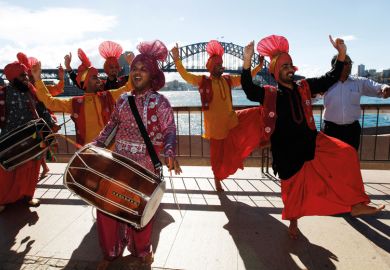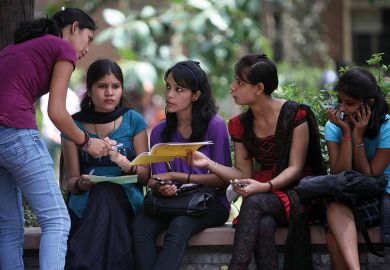The University of Melbourne has pinpointed the research and geographical areas that will underpin its work with India, as it moves to cement relations with the subcontinent.
Australia’s top-ranked university has also appointed an assistant deputy vice-chancellor to manage its relationship with the rapidly growing country which is projected to become the world’s most populous within the next few years.
The plans, outlined in a five-year strategy, signify the latest pivot towards India amid concerns over the relationship that Australia’s universities – and its research-intensive institutions in particular – have with China.
Universities have attracted criticism for being too financially reliant on Chinese students’ tuition fees, while the increase in collaborative research involving the two countries has prompted warnings that some of it may not be in Australia’s national security interests.
Launching the strategy in New Delhi, Melbourne vice-chancellor Duncan Maskell said that he wanted to strengthen and accelerate his university’s existing ties with India to address “shared social and scientific global challenges” such as climate change, water management, health and food security.
“The new strategy will enable academics across varied fields of study to continue to work in partnership with our colleagues in India, curating significant research relationships, developing grants, co-authoring publications and executing significant research projects,” Professor Maskell said.
The document identifies five “themes” as foci for internal funding, “high-level” engagement and whole-university relationships. They are health, sustainability, technological innovation, inclusivity and governance, and mutual understanding.
Geographical priority areas for collaboration will be Delhi and the surrounding National Capital Region; the industrial powerhouse state of Maharashtra; neighbouring Karnataka and Telangana; the southern states of Kerala and Tamil Nadu; and Uttar Pradesh and West Bengal in the north and north-east.
The document also flags the appointment of chemistry professor Muthupandian Ashokkumar as assistant deputy vice-chancellor international (India).
Professor Ashokkumar has assumed responsibility for the university’s strategy and relationships with the subcontinent, including representation there. He will also convene a working group from the university’s academic divisions and its two “India-engaged” institutes, Asialink and the Australia India Institute.
The document outlines “key initiatives” including the establishment of an Indian equality law programme and expansion of the Melbourne-India Postgraduate Academy, a five-year-old scheme that enables joint supervision of postgraduate researchers from Melbourne and top Indian research universities.
Australia’s high commissioner to India, Harinder Sidhu, said that Melbourne’s push would complement the India Economic Strategy released last year by her predecessor Peter Varghese, the current chancellor of the University of Queensland.
Mr Varghese told last week’s Times Higher Education Australia Universities Forum that Queensland was putting a “particular priority” on India and Indonesia as “two large underdeveloped markets, particularly for Group of Eight universities”. Melbourne is scheduled to release a separate Indonesia strategy in Jakarta later this week.
Register to continue
Why register?
- Registration is free and only takes a moment
- Once registered, you can read 3 articles a month
- Sign up for our newsletter
Subscribe
Or subscribe for unlimited access to:
- Unlimited access to news, views, insights & reviews
- Digital editions
- Digital access to THE’s university and college rankings analysis
Already registered or a current subscriber?








